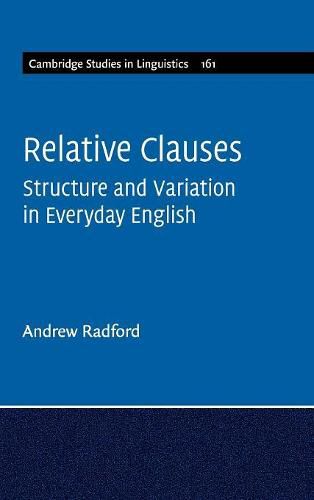Readings Newsletter
Become a Readings Member to make your shopping experience even easier.
Sign in or sign up for free!
You’re not far away from qualifying for FREE standard shipping within Australia
You’ve qualified for FREE standard shipping within Australia
The cart is loading…






Using novel examples from live, unscripted radio/TV broadcasts and the internet, this path-breaking book will force us to reconsider the nature of everyday English and its complex interplay of syntactic, pragmatic, sociolinguistic and psycholinguistic factors. Uncovering unusual types of non-standard relative clauses, Andrew Radford develops theoretically sophisticated analyses in an area that has traditionally hardly been touched on: that of nonstandard (yet not clearly dialectal) variation in English. Making sense of a huge amount of data, the book demonstrates that some types of non-standard relative clauses have a complex syntactic structure of their own in which the relation between the relative clause and its antecedent is either syntactically encoded or pragmatic in nature, while others come about as a result of hypercorrection, and yet others arise from processing errors.
$9.00 standard shipping within Australia
FREE standard shipping within Australia for orders over $100.00
Express & International shipping calculated at checkout
Using novel examples from live, unscripted radio/TV broadcasts and the internet, this path-breaking book will force us to reconsider the nature of everyday English and its complex interplay of syntactic, pragmatic, sociolinguistic and psycholinguistic factors. Uncovering unusual types of non-standard relative clauses, Andrew Radford develops theoretically sophisticated analyses in an area that has traditionally hardly been touched on: that of nonstandard (yet not clearly dialectal) variation in English. Making sense of a huge amount of data, the book demonstrates that some types of non-standard relative clauses have a complex syntactic structure of their own in which the relation between the relative clause and its antecedent is either syntactically encoded or pragmatic in nature, while others come about as a result of hypercorrection, and yet others arise from processing errors.